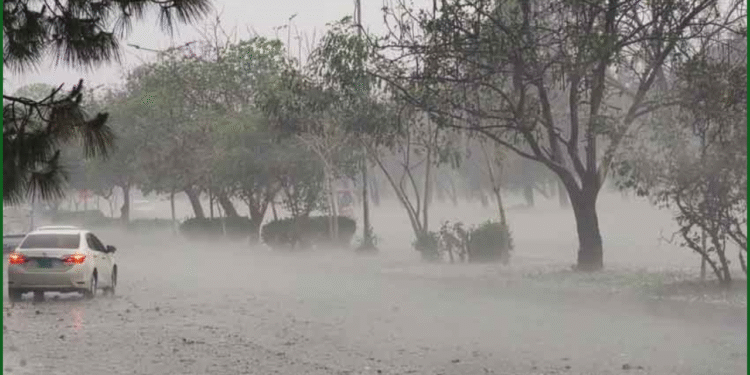Islamabad, Pakistan – May 24, 2025 – The federal capital, known for its serene landscapes and temperate climate, experienced a remarkable weather transformation today as scorching summer heat was abruptly replaced by heavy rainfall and an intense hailstorm. The sudden shift caught residents off guard, bringing both relief from the soaring temperatures and challenges due to the storm’s ferocity.
For weeks, Islamabad had been grappling with an unrelenting heatwave, with temperatures hovering around 40°C. The sweltering conditions had strained daily life, prompting residents to seek shade and hydration. However, a powerful weather system swept through the region late Friday evening, delivering torrential rain and hailstones that blanketed streets, transforming the city into a glistening spectacle.
According to the Pakistan Meteorological Department (PMD), the storm was triggered by a westerly disturbance interacting with warm, moist air, creating conditions ripe for thunderstorms and hail. Some areas reported hailstones as large as marbles, which pelted vehicles, rooftops, and greenery, causing minor damage in certain neighborhoods. Low-lying areas faced water accumulation, leading to temporary traffic disruptions along major roads like the Islamabad Expressway and Constitution Avenue.
“It was like the sky decided to cool us down all at once,” said Ayesha Khan, a resident of Sector G-11. “One moment it was unbearably hot, and the next, we were running for cover from the hail!”
Local authorities, including the Capital Development Authority (CDA) and traffic police, were quick to respond, clearing drainage systems and managing road blockages. The National Disaster Management Authority (NDMA) issued an advisory urging residents to avoid unnecessary travel during heavy downpours and to secure loose outdoor items that could be damaged by strong winds or hail.
The storm also brought a welcome drop in temperature, with the mercury falling to a pleasant 22°C by Saturday morning. Markets and parks, which had been quiet during the heatwave, buzzed with activity as families ventured out to enjoy the cooler weather. However, the PMD has warned that more rain and possible thunderstorms could occur over the next 48 hours, advising vigilance for potential flash flooding in vulnerable areas.
Environmentalists point to this erratic weather as a sign of broader climate shifts affecting Pakistan. “These sudden transitions from extreme heat to intense storms are becoming more frequent,” noted Dr. Sarah Ahmed, a climate researcher based in Islamabad. “It’s a reminder that we need better urban planning and infrastructure to cope with such unpredictable weather patterns.”
As the city recovers from the storm’s impact, residents are reflecting on the dual nature of this weather event—a respite from the heat but a challenge to infrastructure and daily routines. For now, Islamabad’s skies remain overcast, with the promise of more rain keeping the capital on alert.

















































